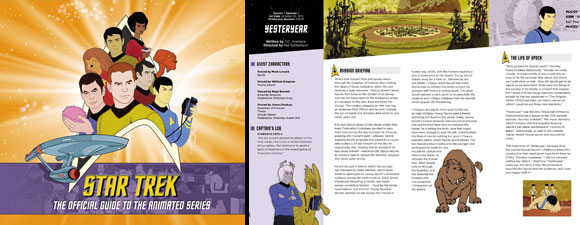Retro Review: The Magicks of Megas-tu
5 min readThe Enterprise enters the center of the galaxy, where magic has more power than technology.
Plot Summary: Sent to the galactic center to see whether matter is being created there, the Enterprise enters a matter-energy whirlpool. Life support fails and the crew is dying when a creature that looks like a faun appears and restores power. The creature introduces himself as Lucien and takes the senior crewmembers to the planet’s surface, where they find people who never age and can make castles out of thin air. Lucien explains that when his people passed through the dimensional portal that the Enterprise also crossed to reach his world, his people found Earth and became known to humans as wizards and magicians. Suddenly Lucien warns them to conceal themselves and returns them to the Enterprise, where Spock discovers that through the power of his own will, he can perform telekinetic feats. But the crew is brought back to the planet by angry people dressed as Puritans from Massachusetts, where they are placed in stocks and told that they will be tried for crimes like the Salem Witch Trials, which led to the burnings of several of Lucien’s people on Earth. Because Spock is not human, leader Asmodeus allows him to defend the humans. Spock asks Kirk whether humans have changed since the events in Salem, and Kirk testifies that humans now try to understand and respect all life forms, as the records aboard the Enterprise prove. Agreeing that humans pose no threat, Asmodeus says that Lucien – once known on Earth as Lucifer – must still be punished for contacting the ship, but Kirk argues that Lucien is an intelligent being and uses his newfound magic powers to defend Lucien. Asmodeus says the trial was a test of the humans’ true intentions and agrees with Spock that Kirk’s compassion for Lucien is proof that humans have changed.
Analysis: While some episodes of the animated series, like “Yesteryear,” are so good that they’re considered to be Star Trek canon, other episodes, like “The Magicks of Megas-Tu,” are so bad that fans either try to pretend they don’t exist or put them on late at night at Star Trek conventions to play drinking games and laugh uproariously. I will admit that I never made it all the way through this episode before, though I did read the Alan Dean Foster adaptation of the story in Star Trek Log Three. How bad is “The Magicks of Megas-Tu”? Let’s just say that the script – in terms of science, characterization, even factual details of Earth history – is so terrible that the candy-cane-striped watermelon planet at the center of the galaxy looks good by comparison. I wish I could say “this episode will be fun for fans of fantasy or Harry Potter or Magic: The Gathering,” but really, I think it’s only fun for people like my younger son, who thinks Star Trek is pretty ridiculous at the best of times and enjoys it most when it’s so screechingly awful that everyone in the room is laughing at it.
I’m trying to think of something defensible about “The Magicks of Megas-Tu” and coming up blank. The animation is seizure-inducing; the Enterprise passes through Fourth of July fireworks to reach the center of the galaxy, where it is trapped by the sort of swirly effects that accompany Heffalumps and Woozles in Winnie-the-Pooh cartoons. Then the crew ends up in a version of Salem populated by Pilgrims from two generations earlier. I’m not sure why Spock bothers with a defense when he could simply point out that the facts prove the Magicks were never really in Salem, since the victims there were hanged, not burned, and since three times as many women as men were executed in Salem yet Asmodeus and his fellow leaders all appear to be men (the women on the planet are shown as busy buying potions for eternal youth and beauty, though oddly there are crones who apparently spend their time selling these potions instead of being young and beautiful). I won’t get started on the suggestion that the all too real bigotry and misogyny of the Salem Puritans might have been justified by the presence of meddlesome magical aliens, because guess what – the Devil really was among the witches in this version of the story! Kirk tells Asmodeus he isn’t interested in legend, yet he’s willing to perpetuate this absurd falsehood.
As for the galaxy being created by a central explosion that may still be creating new matter, that isn’t nearly as incredible as the theological resolution. Kirk does what I’ve never seen Jesus do in any Christian revisionist fable – he saves Lucifer! He’s willing to risk his own life to do so, to recite “I do believe in fairies, I do, I do,” and to cast Magic Missile and let the Heart of the Cards guide him. (I can’t take credit for all that analysis; my kids were shouting those suggestions while Kirk was dueling onscreen.) I’m not sure whether this makes Kirk a messiah or a demon or what, but I wish he’d been around to save Viggo Mortensen in The Prophecy, because Viggo was a much sexier Satan than Lucien. Oh dear, I’m clearly going to hell, but I knew that already, because I was told by some ultra-religious nutters that being a Harry Potter fan was the equivalent of devil worship, and with Star Trek confirming that all previous reports of magic on Earth actually arise from extraterrestrial interference headed up by Lucifer himself, they have a point.
I’m going to go back to pretending this episode never existed in a moment, but first I must pause and contemplate an obvious parallel that could have been exploited. Kirk will make another trip to the center of the galaxy in another installment that’s widely considered only marginally canonical, meeting – and destroying – God in Star Trek V: The Final Frontier. (How did William Shatner not remember “The Magicks of Megas-tu” while working on the movie’s screenplay, and not realize it was going to be a very bad idea?) Just think how differently things might have gone had Kirk remembered this previous trip to Sha Ka Ree and realized from the start that God was just the devil in disguise. But if he did recall it, he probably wrote it off as a bad drug trip, which is what it looks like on the screen.






